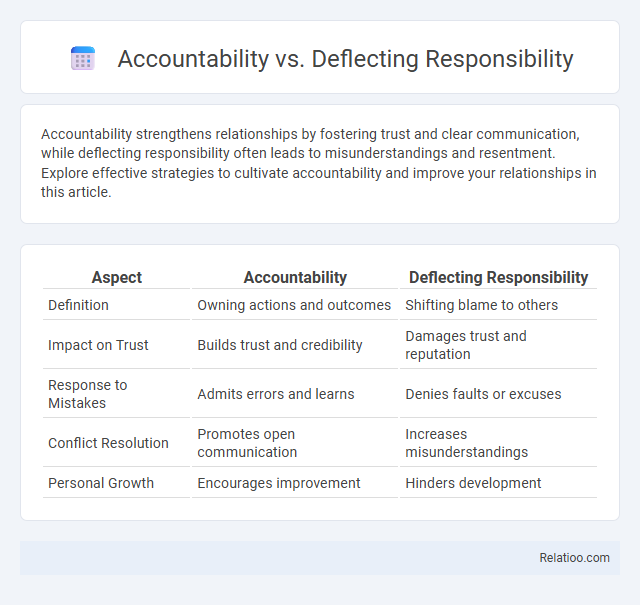Accountability strengthens relationships by fostering trust and clear communication, while deflecting responsibility often leads to misunderstandings and resentment. Explore effective strategies to cultivate accountability and improve your relationships in this article.
Table of Comparison
| Aspect | Accountability | Deflecting Responsibility |
|---|---|---|
| Definition | Owning actions and outcomes | Shifting blame to others |
| Impact on Trust | Builds trust and credibility | Damages trust and reputation |
| Response to Mistakes | Admits errors and learns | Denies faults or excuses |
| Conflict Resolution | Promotes open communication | Increases misunderstandings |
| Personal Growth | Encourages improvement | Hinders development |
Understanding Accountability: Definition and Importance
Accountability involves taking ownership of one's actions and their outcomes, establishing trust and reliability in both personal and professional settings. It ensures clarity in roles and expectations, fostering a culture of transparency and continuous improvement. Deflecting responsibility and deflection undermine this process by shifting blame and avoiding self-assessment, which can erode credibility and hinder effective problem-solving.
What Does It Mean to Deflect Responsibility?
Deflecting responsibility involves shifting blame or avoiding accountability for one's actions by redirecting attention away from personal errors or duties. This behavior undermines trust and hinders problem-solving by preventing individuals from acknowledging their role in a situation. Understanding deflection is crucial for fostering a culture of transparency and ownership in personal and professional environments.
Key Differences Between Accountability and Deflecting Responsibility
Accountability requires owning your actions and their outcomes, demonstrating transparency and a commitment to improvement, while deflecting responsibility involves shifting blame to others or external factors to avoid consequences. Your ability to embrace accountability fosters trust and growth, whereas deflection undermines credibility and obstructs problem-solving. Understanding these key differences highlights that accountability is proactive engagement, and deflecting responsibility is a reactive avoidance.
The Psychological Roots of Deflection
Deflection often stems from deep-rooted psychological mechanisms such as fear of judgment, low self-esteem, or an inability to cope with personal failure, causing individuals to redirect blame away from themselves. This behavior serves as a defense mechanism to protect the ego and avoid the discomfort associated with accountability. Understanding these psychological roots can help you develop greater self-awareness and foster a mindset oriented toward taking responsibility rather than deflecting it.
The Impact of Accountability in Workplace Culture
Accountability in workplace culture fosters trust, improves team performance, and encourages personal growth by ensuring individuals take ownership of their actions and decisions. Deflecting responsibility and deflection undermine collaboration, create confusion, and erode morale by shifting blame away from oneself to others or external factors. Emphasizing accountability cultivates a transparent and productive environment, driving sustained organizational success and employee engagement.
Signs Someone Is Deflecting Responsibility
Signs someone is deflecting responsibility include avoiding direct answers, shifting blame to others, and using vague language to evade accountability. When your interactions reveal frequent excuses or changing the subject during discussions about mistakes, it often indicates deflection rather than ownership. Recognizing these behaviors helps maintain clear communication and ensures your expectations for accountability are met.
Consequences of Avoiding Accountability
Avoiding accountability leads to diminished trust and damaged relationships in both personal and professional settings, as it signals unreliability and lack of integrity. When you deflect responsibility, it often results in unresolved problems, decreased team morale, and missed opportunities for growth and learning. Businesses and individuals who consistently avoid accountability may face reputational harm, reduced productivity, and a toxic environment that hinders long-term success.
Strategies to Foster a Culture of Accountability
Establishing clear expectations and consistent consequences encourages accountability by ensuring everyone understands their roles and responsibilities. You can foster a culture of accountability by promoting open communication and creating safe spaces for feedback, which reduces the likelihood of deflecting responsibility and deflection. Implementing regular performance reviews and recognizing demonstrations of accountability strengthens commitment and transparency across teams.
How Leaders Can Model Accountability
Leaders can model accountability by openly acknowledging their mistakes and taking full responsibility for outcomes, creating a culture of trust and transparency. Your behavior sets the standard for your team, encouraging others to own their actions rather than deflecting blame or responsibility. Demonstrating consistent accountability drives higher performance and fosters a supportive environment where problem-solving thrives.
Overcoming the Temptation to Deflect Responsibility
Overcoming the temptation to deflect responsibility requires cultivating self-awareness and embracing accountability as a core value in personal and professional growth. Implementing clear feedback mechanisms and fostering a culture of trust can reduce the instinct to shift blame, encouraging individuals to own their actions and learn from mistakes. Consistent practice of reflective decision-making enhances integrity and strengthens leadership credibility.

Infographic: Accountability vs Deflecting Responsibility
 relatioo.com
relatioo.com